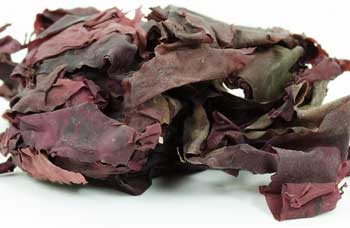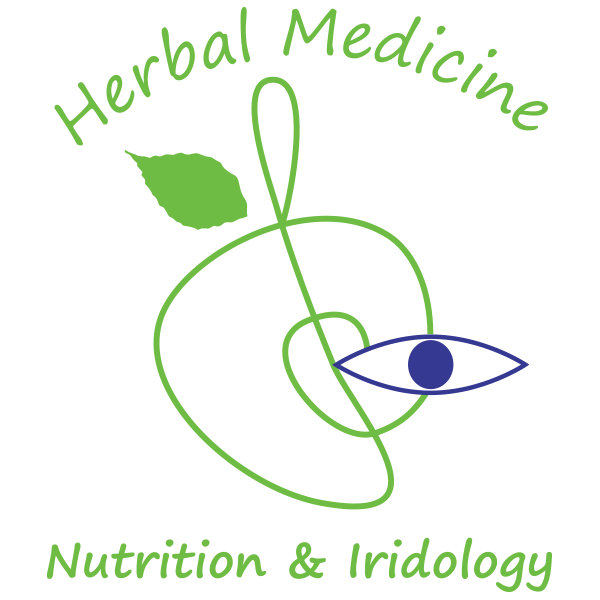Dulse: Palmaria palmate

Dulse, also known as Dillisk, (Dilleasc or Creathnach in Irish), is a red seaweed that has been harvested along the coasts of Ireland for centuries. It is sold dried, either whole or flaked. Dried dulse has a soft, chewy texture and rich umami flavour. It has been likened to smoked bacon and enriches the taste of accompanying seasoning. The dried flakes can be sprinkled directly on food as a salt replacement and to add interest to salads and grain dishes. Whole dried dulse is best pre-soaked, strained and cut into smaller pieces before adding to soups, stews and other recipes for an appreciable nutritional boost. It is also a popular ingredient in breads and I like adding it into a baked vegetable loaf.
Dried dulse nutrition
Dulse is an excellent source of iodine, vitamins B, C and manganese. It is a very good source of vitamin A and copper, and a good source of protein, pantothenic acid, potassium, iron, zinc and phosphorus, Vitamins B1, B3 and B6.¹
The health benefits of dulse include:
- Dulse is high in vitamins A and C and carotenoid antioxidants such as alpha-carotene, beta-carotene, lutein and zeaxanthin, which are known to improve eyesight and reduce damage from free radicals.
- Dulse is also high in complex polysaccharides that are known to be antiviral, to nourish the skin, soothe inflammation and help to detoxify the body.
- Iodine stimulates the thyroid gland, which is responsible for maintaining a healthy metabolism. It also assists with the removal of toxic chemicals from the body.
- Dulse is a good source of protein that contains all the essential amino acids, which are the basic building blocks of the body.
- The high mineral content in dulse, which includes calcium, magnesium and iron, contribute to bone mineral density and can help to protect against joint and tissue damage. Vitamin A also helps keep the bone marrow and white blood cells healthy.
- Dulse is high in potassium which helps to trigger your heartbeat which circulates blood throughout your body. Potassium also help to maintain fluid, electrolyte and pH balance, promote muscle growth, and maintain healthy nervous system and brain functioning. However, if you have a kidney condition or you are on a low potassium diet, you may want to avoid dulse or check your potassium levels with your doctor first. Dulse harvested off the coast of Spain was found to have 38 times more potassium than a banana.
- As a source of dietary fibre dulse bulks up stool formation and has been used to relieve constipation and diarrhoea and to expel parasites.
- Dulse is also high in polyunsaturated fatty acids (PUFAs) which are important for proper brain and nervous system functioning, and for anti-inflammatory and antioxidant activity. This study found that dulse is not only high in PUFAs but in the ideal ratio of Omega 3 to Omega 6 fatty acids.
Try including dulse and other seaweeds in your diet.
They are a powerful source of electrolytes as well as blood purifying chlorophyll and polysaccharides that act as natural detoxifiers of heavy metals and other toxic substances. Many of the sea vegetables help to improve digestion, decrease LDL cholesterol, increase bone density, lower blood pressure and have been shown helpful for reducing excess body weight.²
Related Post: Dulse Soup
References:
(1) What’s New and Beneficial about Sea Vegetables. Online article. Available at: http://www.whfoods.com/genpage.php?tname=foodspice&dbid=135 (accessed 31 August 2016)
(2) Seaweed Nutrition, The Oceans Superfood. Online article. Available at: http://www.superfoods-for-superhealth.com/seaweed.html (accessed 31 August 2016)

